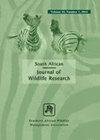African Wild Dog Habitat Use Modelling Using Telemetry Data and Citizen Scientist Sightings: Are the Results Comparable?
引用次数: 6
Abstract
Quantifying landscape characteristics that wildlife select is essential for conservation and management action. Models that map wildlife resource selection tend to be informed by telemetry technology which is costly to acquire/maintain and potentially risky to deploy. Therefore, there is value in pursuing alternative data collection protocols, such as citizen scientist approaches to ascertain whether they can reveal results comparable to those derived from telemetry studies. The conservation of African wild dogs (Lycaon pictus) presents an interesting case study to examine this topic. The species is rare and wideranging, hence data collection is both challenging and costly. They are, however, a groupliving species with unique and conspicuous coat markings, making them potentially well-suited to citizen science data collection strategies. Here, we fitted resource selection functions (RSFs) built from Global Position System (GPS) telemetry data, and from citizen scientist data, collected in and around Hwange National Park, Zimbabwe. We assessed comparability of these RSFs by evaluating the relative importance of parameters, parameter coefficients (direction and magnitude of effect), and the spatial predictions of relative probability of use by African wild dogs. The most important predictors in both models were proportion of woodland and bushland, the number of habitat types, and distance to waterhole. Furthermore, spatial predictions from both models displayed a high degree of overlap (r = 0.74), indicating similarities in selected and avoided habitat patches. Our analysis demonstrates that sufficient citizen science data can be a valuable alternative to telemetry data for African wild dogs. We thus encourage the collection and use of citizen science data for similar analyses, particularly when funding is limited. Our work also highlights areas in and around Hwange National Park with the highest probability of being used by African wild dogs, which is where conservation efforts should be intensified.非洲野狗栖息地使用遥测数据和公民科学家观测建模:结果可比较吗?
量化野生动物选择的景观特征对保护和管理行动至关重要。绘制野生动物资源选择地图的模型往往是通过遥测技术提供信息的,而遥测技术的获取/维护成本很高,部署起来也存在潜在风险。因此,寻求其他数据收集协议是有价值的,例如公民科学家的方法,以确定它们是否可以揭示与遥测研究所得的结果相当的结果。非洲野狗(Lycaon pictus)的保护提供了一个有趣的案例研究来研究这个话题。该物种稀有且分布广泛,因此数据收集既具有挑战性又昂贵。然而,它们是一种群居物种,具有独特而明显的皮毛标记,这使得它们可能非常适合公民科学数据收集策略。在这里,我们拟合了基于全球定位系统(GPS)遥测数据和公民科学家数据建立的资源选择函数(RSFs),这些数据收集于津巴布韦万基国家公园及其周边地区。我们通过评估参数的相对重要性、参数系数(影响的方向和大小)以及非洲野狗使用相对概率的空间预测来评估这些RSFs的可比性。在两个模型中,最重要的预测因子是林地和灌木林的比例、栖息地类型的数量和到水坑的距离。此外,两种模型的空间预测结果显示高度重叠(r = 0.74),表明选择和避免的生境斑块具有相似性。我们的分析表明,足够的公民科学数据可以成为非洲野狗遥测数据的有价值的替代方案。因此,我们鼓励收集和使用公民科学数据进行类似的分析,特别是在资金有限的情况下。我们的工作还强调了万基国家公园及其周围最有可能被非洲野狗使用的区域,这是应该加强保护工作的地方。
本文章由计算机程序翻译,如有差异,请以英文原文为准。
求助全文
约1分钟内获得全文
求助全文

 求助内容:
求助内容: 应助结果提醒方式:
应助结果提醒方式:


